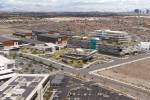Look at economic development produces road map for diversification
Nevada's most substantial look yet at economic development has produced an ambitious road map for diversifying the economy.
Gov. Brian Sandoval on Monday called the new plan "the gold standard in blueprints."
"Now, it's about implementation," Sandoval added.
The new report, called "Unify, Regionalize, Diversify: An Economic Development Agenda for Nevada," spends roughly 150 pages laying out a strategy for drawing new industries to the Silver State.
Sandoval met Monday afternoon in Carson City with Lt. Gov. Brian Krolicki, Secretary of State Ross Miller and other state leaders and businesspeople to discuss the report, written by the Brookings Institution's Brookings Mountain West division and its Metropolitan Policy Program.
It's not the first time Nevada officials have looked at diversification in Nevada. But the results will be different this time, they said.
"There may be some skepticism, because we have done so many studies in the state that have done nothing but sit on some bookshelf," Miller said. "I'm convinced this isn't one of those studies."
Mark Muro, coordinator of Brookings Mountain West and a senior fellow with the Metropolitan Policy Program, said Nevada Assembly Bill 449, signed into law in June, requires state leaders to work harder to diversify the economy. The law, which mandated the Brookings study, also has put into motion some elements of the think tank's plan, including the creation of startup funds.
But Muro also warned officials that progress would take time.
"We counsel you to reject grandiose thinking and silver bullets," Muro said. "Get your hands dirty with a piece-by-piece execution. We look at the economy as it really is rather than as you hope it would be."
Progress will come 20, 80 or 300 jobs at a time, Muro said. Rather than promising to create 150,000 jobs in five years, officials' goals should be more realistic -- say, looking to bring in 15,000 new jobs in health care, or 6,000 in business services, in the next half a decade.
"Break it into chunks and get going," Muro said. "It's not going to happen as fast as some might hope."
SERVICE, MEDICAL INDUSTRIES KEY
The Brookings study makes the need for diversification clear: It notes that more than half of all jobs in Las Vegas are in tourism, construction and real estate and retail. Nationally, 30.8 percent of jobs are in those fields.
The study also notes that Nevada will add 117,000 jobs through 2016, for an annual job-creation rate of 1.6 percent. That'll best the national average of 1.2 percent job growth. But consumption-based industries won't play as big a role in new jobs. Rather, industries including financial services, medicine and business services that are growing quickly nationwide will be key to job growth, the study said.
The report identifies seven industries that state leaders should target to boost economic development. Some of those sectors are already strong here, but it's more about moving up the value chain than continuing to do the same thing over and over, researchers said.
Take tourism and gaming. Nevada has some of the world's leading hotel-casino markets. Now, the state should lasso that industry dominance to diversify the industry, perhaps moving into niche tourism offerings, focusing more on retirees and second-home owners and boosting film and media activity here.
Brookings also recommended establishing Las Vegas as the intellectual capital of global gaming and the center of online gaming, if it becomes legal.
In mining and manufacturing, the state could develop supply chains for medium-value minerals, manufacture advanced composite materials and organize and market its manufacturing base.
Upgrading the state's clean-energy industry with manufacturing, transmission, geothermal development and energy-efficiency efforts could also bolster economic development.
Health and medical services, including surgical specialties and geriatrics, also made the study's list of ripe targets. The industry makes up fewer than 6 percent of jobs in Nevada, compared with 9 percent nationwide.
The report says there are opportunities in information technology as well, particularly with call centers, e-commerce headquarters, data centers, cloud computing and cyber security.
The logistics and operations industry holds promise in subsectors such as warehousing and distribution, air cargo, ground and rail freight shipping, integrated manufacturing and distribution operations and food processing.
Finally, Nevada's leaders should look to ramp up the state's aerospace and defense sector by attracting operations that supply, assemble and test unmanned aerial vehicles and maintain, repair and overhaul aircraft systems.
ATTRIBUTES, WEAKNESSES
Nevada's attributes include low taxes; business-friendly regulations; historic high growth; good quality of life; extensive entertainment and recreation; proximity to West Coast population centers, markets, transportation routes and ports; excellent airport infrastructure; and excellent natural and physical resources. Its opportunities include a lower cost of living than California's; relatively affordable housing and high commercial vacancies; large numbers of visitors who give the state a chance to "sell" itself; and world-class Internet connectivity in Las Vegas.
Weaknesses include an economy weighted toward consumption-based industries; a lack of a "proactive, coherent" diversification strategy or structure; a low-skilled work force; an underperforming K-12 education system; relatively high energy costs; lack of startup capital and a real estate bust .
The study offers nearly 40 specific recommendations for addressing those problems and luring new business to the state.
It calls existing economic-development systems "weak and passive," and recommends unifying the state's "diffuse," "fragmented" and "thin" diversification efforts. It advises establishing a "state-of-the-art" statewide operating system complete with goal-setting, data, measurements, benchmarking and information-sharing. It recommends creating performance incentives for regional development authorities. And it counsels encouraging university-industry research collaboration, boosting research and development through tax incentives, increasing access to startup capital, leveraging community colleges to develop a skilled work force, expanding research universities' role in work force development and raising science, technology, engineering and math standards in the K-12 system.























